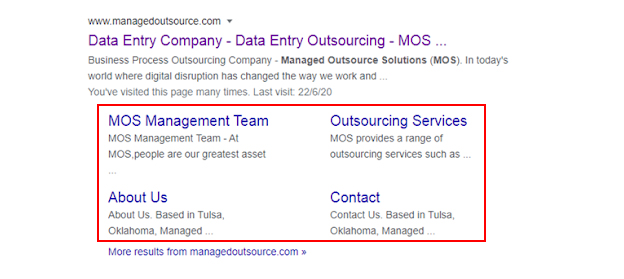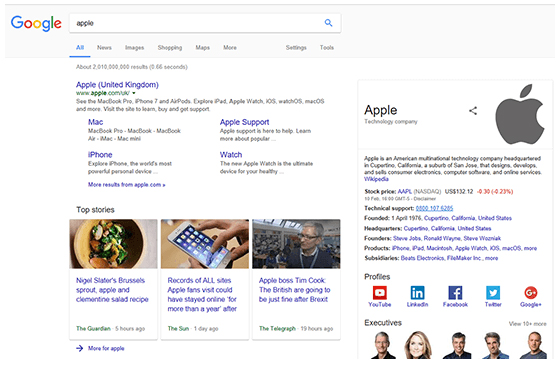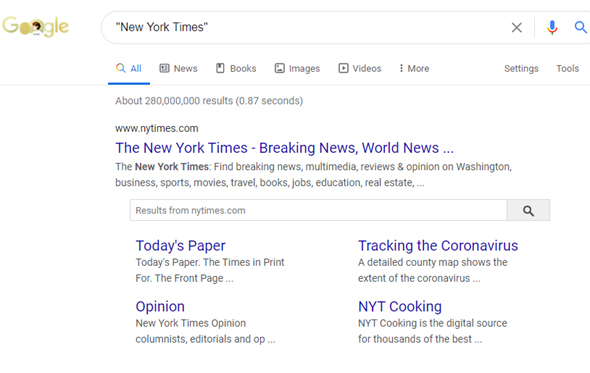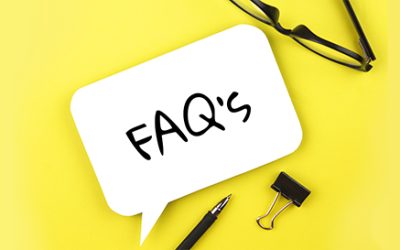Digital marketing in healthcare as well as any other industry primarily focuses on providing better user experience. Search engine rankings are an important element of a good digital marketing strategy. Every website owner tries hard to make their pages reach the top of the Google search result pages. While rankings are important, you also need more people to click on your website in search engine results. High rankings for your main keywords may bring in consistent and relevant traffic that may help your website grow. While it is extremely important to rank well, this may not bring in the desired results if people don’t actually click through to your website from the SERPs. That is where the prominent role of “Google Search Sitelinks” come in. Google sitelinks are those links below the Google search results pointing to different pages of the website that take up to 90 percent of above-the-fold screen space. Site links are a great way to improve your click-through rate (CTR) which in turn brings more website traffic, thereby strengthening your SEO. What are Sitelinks or Google Sitelinks and in what ways can these links help your website – these important aspects are discussed in the blog in detail.
What Are Google Sitelinks?
Google sitelinks first appeared in 2005 and were officially announced in 2006. By 2007, these were a regular feature in search results. In simple terms, Google sitelinks are small sub-listings appearing under the primary search results on the SERPs (search engine result pages). These are internal links to the other pages or sections of a page in the website that come under SERPs, with a short description. Often found when performing a brand search, these links help users easily navigate to relevant information around a website quickly. Sitelinks help users to click on that specific part of the website content which interests them, rather than just clicking on the main URL and navigating to other sections. In addition, these links give users a complete and better idea about the content and areas on the website, which then helps them see the relevance to their particular query.
For instance, when we search for “Managed Outsource Solutions” on Google, we get the website and some of the links below it. The four given links under “managedoutsource.com” along with the “More results from managedoutsource.com” link are called “Sitelinks”. For instance, a user searching for “Managed Outsource Solutions” may not necessarily want to view the homepage. Rather, they might directly want to read information about the range of outsourcing services offered, which is given under the heading “Outsourcing Services”.
In short, sitelinks direct users to the best results within the shortest point of time. Also, these make your website more important in search results, which in a way may directly impact the branding side as well. However, an important aspect is sitelinks do not get displayed automatically. Google only displays them when they believe that these are highly relevant and helpful for the user. Google only selects the pages that get displayed within the sitelink portion and the site owners do not have any direct control over the process. However, website owners can take steps to optimize the website and improve their appearance on the page.
Why Should You Have Google Sitelinks?
Sitelinks are one of the most common features that appear in 1.8 percent of SERPs in the Ahrefs US database. It is estimated that about 67 percent of all organic keywords for Wikipedia.org contain sitelinks. There are several prominent reasons as to why sitelinks can benefit both a website and their visitors –
- Improve Click-Through-Rate (CTR) – Click-through-rate (CTR) is the topmost factor that plays an active role in successfully generating organic traffic. A good CTR directly relates to the popularity of a link and how relevant it is to a particular search query. For instance, when a person conducts a simple brand search, sitelinks offer more significant and pertinent pages that may directly take them to their desired product or services. As per a study conducted by AWR, on an average basis, the first three results account for nearly 55 percent of all clicks. From there onwards, it tends to drop rapidly. Website searchers who get instant access to the specific pages they are looking for will be tempted to click through from the search engine. Higher the number of people who click on your website in the SERPs, the more consistently your website will rank for that specific search term which in turn gets reflected in your organic traffic.
- A Sign of Trust and Credibility – Sitelinks displayed on a website are a sign that Google trusts that website. However, these links may not be displayed for all websites. Google displays sitelinks only for those search results which they think will be useful to the user’s queries. A poorly optimized or untrustworthy website will not have sitelinks displayed in the SERPs.
- Help Browse Deeper Pages – Generally, when a user browses a website, chances are that they will search through their home page, product or service page and blog or article pages. With sitelinks, these popular page links will show up in search results, driving more traffic to the most important pages, helping to deliver leads like inquiries or subscriptions. Therefore, along with high CTR and SEO, sitelinks also help a website benefit from higher conversions.
- Increase Brand and Product Awareness – From Google’s perspective, sitelinks usually link out to the most important pages on your website, considering the number of external and internal links. In most cases, these pages are chosen based on the website’s structure, content and the search term in question. Sitelinks are often product pages, pricing pages, about us pages or blogs which help educate users more about a website or company, products or services offered without even visiting your website.
Generating Good Sitelinks for Your Website – Tips
Getting sitelinks for your website involves no direct or fixed steps. Sitelinks, whether and when they appear, how or which links are chosen are all up to Google’s algorithms. However, like any other aspect of digital marketing and SEO services, there are certain best practices that can be followed to increase the chances of getting sitelinks –
- Create a Unique Name for Your Website – One of the most important steps is to create a unique brand name for your website. As Google search sitelinks are mainly found for brand searches, creating a unique brand name will help you rank in the top position. For instance, if your website is called “The Cake Company”, chances are that it will never gain first result on the first page as the term is too generic. A generic name like this will struggle to rank, as it is quite hard for Google to know whether the user is searching for a cake company in general or this specific company as such. The best way would be to choose a brand name that is unique as this makes it easier for your website to rank higher and secure Google sitelinks. Without a strong brand presence, it is difficult to rank for a fairly generic name. On the other hand, rare company names can rank well and appear on the first page. For instance, the brand name “Apple” – is a good example of the same. Based on user intent, Google will be able to recognize that the searches performed are related to the brand “Apple” rather than the fruit. Therefore, if your company is already an established one, never change the name in order to better target SEO as this is a very complex task.
Link Source – https://bloggingwizard.com/google-sitelinks/
However, this example works only for bigger and established brands and not for smaller brands as they don’t have the leniency where generic brand names are concerned. Therefore, a strong brand presence is crucial for having a high rank for your generic name. A company which is in its pre-startup phase need to choose a name that is unique as this will help better rank in brand searches.
- Use Structured Data – Structured data (also known as rich snippets or schema) helps Google to better understand your website and organization. While structured data can help improve your website’s appearance in the SERPs, by displaying review or event snippets, it can also help when it comes to sitelinks. Structured data can notify Google about the specific menu to consider for sitelinks, specify about or contact page and enable a sitelinks search box.
- Ranking Brand Name at #1 in Search Results – Google sitelinks are mainly assigned to the very first page of the search results. Therefore, if you are to have a chance of getting those sitelinks, you need to be ranking at #1 page at search results. Make sure to take all essential steps like creating a unique brand name, auditing back links, checking online citations (like correct name, address, phone numbers and URL), content marketing tactics (like blogging) and marketing social media profiles and keeping them active may help strengthen your brand’s online presence to a great extent. For instance, if you are searching for the term “New York Times”, the American newspaper based in New York City is the one that gets the Google sitelinks. This is due to the superior ranking of “New York Times” at position #1. Therefore, reaching the number one rank can help you to easily get the sitelinks.
- Focus on Building Internal Links – Internal links help Google to identify the topmost, important pages on your website. The more number of times you link an internal page on your website, the more important that page may appear to Google. For instance, if you frequently link website page to a specific product, contact us page or About Us page, these will be good candidates for sitelinks. Google may take that as a signal for judging the importance of that page. Building internal links not only help Google crawlers navigate your website in better way, but also helps users to move through the website, while engaging with your content.
- Focus on Page Titles – One of the most important elements of SEO, relevant and effective page titles help Google to provide pertinent sitelinks. Google sitelinks are generated from page titles. Therefore, make sure that each page title gives a short but detailed description of the specific content of the page. On the other hand, irrelevant titles (with no connection with the page content) will be difficult to rank and affect SEO. For instance, you shouldn’t give the title “Get to Know Us Better” to your “About Us” page because this may confuse Google and you may get duplicate sitelinks.
- Focus on Clear Website Structure and Navigation – Creating a website with complicated structure is difficult for both search engines like Google to crawl and users to easily navigate. Google won’t be able to assign sitelinks if they can’t find or understand the website pages. Make sure your website have an intuitive structure and use clear headings to organize pages and divide these pages in to different sub-categories wherever possible. Use standard web pages with details like – About, Contact and Product/Services as these are easily understood by Google.
- Add an XML Sitemap in Google Search Console – An XML sitemap helps Google to easily crawl across your website pages. Including sitemaps will enhance the total coverage of your web pages and determine the most important pages on your website. Generally, Google responds based on the priority and the total amount of traffic that web pages receive. Therefore, those websites who have not yet included sitemaps on the Google Search console account can create one.
- Create Brand Awareness – A positive brand reputation is a factor that Google considers to determine rankings. Generating awareness about your website name may help improve your site’s authority. The more number of people know your company by name, the more number of searches you will receive which in turn may increase the chances of getting sitelinks. There are several steps that can help create brand awareness which include – Guest blogging (on popular industry sites), receiving positive reviews and testimonials, participating in online community discussions, reaching out to online news outlets and giving expert interviews.
Sitelinks are one of the most important elements Google introduced to help users find all the essential information easily and quickly. These offer tremendous potential for websites to increase the SERP, boost branding and site traffic. But, like any other important aspect, getting sitelinks doesn’t happen easily. Website owners interested to take advantage of the benefits offered by sitelinks will carefully need to monitor their own website. They should have a clear understanding about the specific queries for which the domain appears in the top positions and track to see if the sitelinks appear for the brand. A basic understanding of the above-mentioned guidelines or factors can make a big difference to the performance of your website and increase their chances of earning sitelinks creating a boost in organic traffic and brand awareness.
If you wish to improve the sitelinks for your website, consult a reliable digital marketing company. Such companies may provide advanced digital marketing services that may help increase the volume and quality of traffic to your medical website, make your services available to a wider patient base and improve your revenue.







